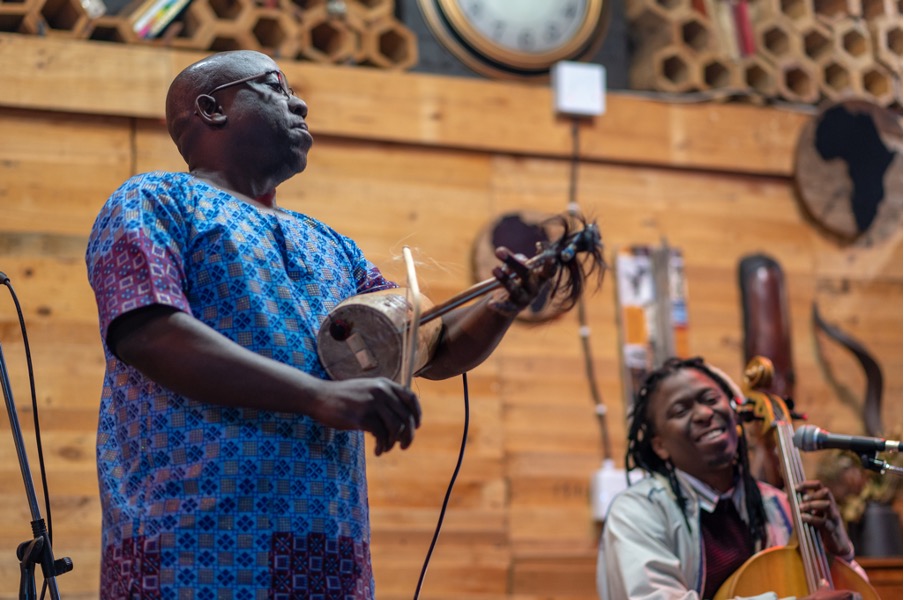Performance and Archive: Retrieving the Musical Genius of the Eastern Cape

A research visit to the Eastern Cape saw composer and cellist Dr Thokozani Mhlambi performing in Makhanda on the 29th of April.
The concert, which took place at The Black Power Station, was the culmination of the 37-year- old KwaZulu-Natal composer’s cultural exploration of the province. Over the last few months, Mhlambi has been visiting museums and archives across the Eastern Cape. He has been researching the genius of early African intellectuals who composed music; the likes of Tiyo Soga, BP Tyamzashe, and Enoch Sontonga (composer of Nkosi Sikelela), to mention a few.
Mhlambi concluded his activities in the region with a musical concert, which drew from this rich archive of African composers. Audiences were treated to soul-drenching Zulu song, with Mhlambi accompanying himself on the baroque cell. This was Mhlambi’s first performance in the region since 2019 when he took part in the National Arts Festival.
“It's very exciting for me, post-pandemic is a very different world. What I know for sure is that Eastern Cape people really appreciate live music, which is important,” he said.
Mhlambi responded to a set of questions posed to him about his research & travels:
- For how long have you been playing music? How did it all start?
Music has been in my veins since I was a kid. At home we would sing hymns from the Methodist hymn-book. This was the first kind of music-making that I was exposed to. When I eventually went to high school, I was fortunate to have the option of doing music as a matric subject. It was then that I began to take music and composing seriously.
While I was growing up in Madadeni township, KZN, I noticed that there were few people who had the opportunity to take up music to a serious level. This motivated me to go on and study further, I realised that this was something I needed, but also which my community could benefit from.
2. You have been on a research visit in the Eastern Cape? What have you discovered?
The Eastern Cape is a very important region historically; it was the place of the colonial encounter, where cultures clashed, where there was active resistance to European invasion. But it was also the place where the first books, newspapers were written by Africans themselves, such as Isigidimi sama Xhosa, Imvo zabantsundu, etc. In the history, are all these contradictions, which make the place worthy of a cultural exploration.
3. Which areas did you visit during your journey? Were there any places that stood out to you in particular?
I got to visit museums and repositories in Makhanda (Albany Museum, Cory Library).
I got to visit in Gqeberha (ARTEC Gallery in Central), I also had a chance of visiting choral music groups in Njoli (KwaZakhele), NMU music department. And had interactions with Amathole museum (in Qonce/King Williamstown).
4. Are there any moments worth highlighting from your travels and research?
As I was looking at the archives, I saw how African composers in the past had to struggle to get their music published. They had to be approved by the missionaries, who owned the printing presses. Sometimes the missionaries would pass value judgments on the quality of the music produced by Africans, even when they did not speak the languages used (isiXhosa, Seotho, chiShona, etc.)
I think just the idea of having this great heritage, and the fact that I have opportunities which were not available to my ancestors. That is what I have discovered in my journey, this has made me more committed in my task as a music creator.
5. Can you say something about the themes in your performance?
The music is characterised by a range of universal themes. There is a theme of lost love, there is the theme of unity in diversity, there is the theme of self-learning.
6. What did audiences experience when you performed?
I think audiences heard me sing and play the cello, singing my own compositions and some highlights from the music of early African composers. I was also privileged to be joined on stage by Albert Bisaso Ssempeke, who is a Ugandan traditional musician. Us sharing the stage as African brothers from different parts of the continent was timely; while we are experiencing the immigration crisis and xenophobia in South Africa. It affirms my personal vision of Africa as a spiritual home that belongs to all of us.

Image Courtesy of Rushay Booysens 2022, Makhanda, Eastern Cape.
Mhlambi is known for incorporating art with music, having held an artistic residency at the prestigious Cite International des Arts in Paris France, and having his music used as a soundtrack for an exhibition at the Museum of Modern Art in New York. Also in 2021, Mhlambi contributed a sound piece as part of a group exhibition “Here History Began. Tracing the REverberations of Halim El-dabh,” which took place at the Savvy Contemporary in Berlin.
“Obviously, during the pandemic, most artists had more time for themselves than for their
audiences. This gave me a chance to go deeper in my art. I hope audiences relate to my new sound. It's not so different, but the atmosphere post-pandemic gives the music a fresh breath,” said Mhlambi.
Some of Mhlambi’s new works, such as "Inkenqe," were created as part of the Five Hundred Year Archive project at UCT. The project commissioned the work from Mhlambi to go together with its podcast on William Gqoba (Xhosa literary intellectual), and Gqoba’s views on the Nonqawuse cattle-killing of the 19th century.